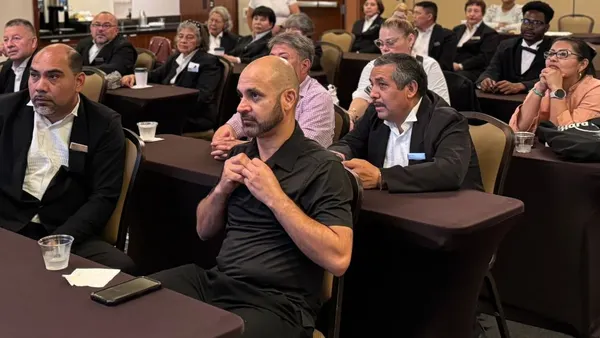Dive Brief:
- Black representation in the upper levels of hospitality industry leadership increased slightly in 2022, with Black executives holding 2.2% of positions from director to CEO levels, according to a report by the School of Hospitality Management at Penn State University, with financial support from the AHLA Foundation.
- The fourth annual Black Representation in Hotel Industry Leadership report found that Black representation decreases the higher the leadership position. In 2022, there was one Black director for every 33 director positions, one Black chief for every 64 C-level positions and one Black CEO or president for every 92 positions at the top.
- Overall, Black employees remain significantly underrepresented in hospitality industry leadership compared to what would be expected given Black representation in the total industry workforce, the report details.
Dive Insight:
In a workplace without bias or disadvantage, according to the report's authors, the share of Black employees in leadership should be approximately equal to Black employees’ overall share in the hospitality labor force.
According to the Bureau of Labor Statistics, Black employees make up approximately 15.2% of the overall workforce in the travel accommodation industry, equating to one Black employee for every 6.6 total employees.
However, across leadership positions in 2022, the gap was significantly wider. The report found there was one Black director for every 33 directors, one Black vice president for every 32 VPs, one Black executive vice president for every 59 EVPs, and Black representation continued to decrease for higher positions.
Black employees in leadership positions are most likely to hold roles in the HR, operations and accounting/finance fields compared to investment/development, food and beverage and asset management, the report finds. Nearly 27% of Black executives surveyed hold positions in HR.
To create a more diverse and inclusive hospitality labor force, there must be significant change to the opportunities offered to Black hospitality employees, according to Peggy Berg, chair of the Castell Project, which has done similar research on Black representation in hospitality leadership.
“As Executive Director of Tourism Diversity Matters Greg DeShields says, ‘We need to rethink working in the hospitality industry and rebuild trust. This requires hiring diverse talent into higher levels of management, acting upon the importance of having leaders who reflect the demographics of our customers and creating an inclusive workplace,’” Berg said in a statement.
Underrepresentation of Black employees spills into hotel ownership too, with research from the National Association of Black Hotel Owners, Operators and Developers showing that despite nearly 20% of the lodging workforce being Black, less than 2% of hotel owners are Black.
Wyndham and Marriott have created programs to balance the ownership playing field. Wyndham’s BOLD (Black Owners and Lodging Developers) program assists Black entrepreneurs on their path to hotel ownership, while Marriott’s Bridging the Gap program — aimed at building a more diverse owner and franchisee community — provides financial support for qualifying owners.
Released earlier this year, another Penn State study conducted on behalf of the AHLA Foundation found that women are also underrepresented in hospitality leadership roles as they rise in the ranks. While women and men are currently equally represented at the director level, there are still 11.4 men for every woman at the partner/principal level.










